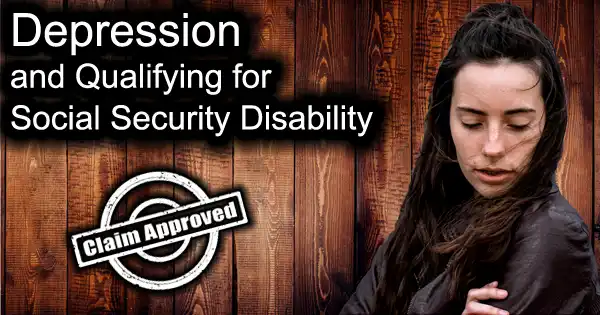Depression and Qualifying for Social Security Disability
Author: Attorney Lloyd Bemis
Updated: 4/11/2025
Can I get disability benefits if I am suffering from the effects of Depression?
Depression can significantly impact an individual’s ability to work and is a common condition listed on applications for Social Security Disability Income. To qualify for disability benefits, you must meet specific financial criteria and provide medical evidence. The Social Security Administration lists depression as an impairment in its Blue Book under Section 12.04, and to qualify, you must meet certain criteria related to medical documentation and limitations in mental functioning. There are also additional criteria for individuals living in supervised or protected environments. Detailed medical records are essential for the application process.
Can I get disability benefits if I am suffering from the effects of Depression?
Depression is a serious mental health condition that affects millions of Americans, often impacting their ability to maintain employment and perform daily activities.
For those whose depression is severe enough to prevent them from working, disability benefits may provide crucial financial support. This guide explores the process of qualifying for disability benefits due to depression, covering essential information about eligibility requirements, application procedures, and alternative options.
Table of Contents:
1. Statistics of Depression
Depression is one of the most common mental health disorders in the United States.
According to recent data:
- Approximately 21 million adults in the United States (8.4% of all adults) experienced at least one major depressive episode in 2020.
- The prevalence of depression is higher among females (10.5%) compared to males (6.2%).
- The age group with the highest rates of depression is adults aged 18-25 (17%).
- Depression is the leading cause of disability worldwide and is a major contributor to the overall global burden of disease.
- Only about 65% of adults with depression receive treatment in the United States.
- Depression costs the U.S. economy approximately $210.5 billion annually in medical costs, reduced productivity, and lost wages.
- Depression is a significant risk factor for suicide, which is the 10th leading cause of death in the United States.
These statistics highlight the widespread impact of depression on American society and underscore the importance of providing support systems, including disability benefits, for those severely affected by this condition.
2. Functional Challenges Related to Depression
Depression can significantly impair a person’s ability to function across multiple domains of life.
These functional challenges often form the basis for disability claims. Common functional impairments include:
Cognitive Difficulties:
- Impaired concentration and attention
- Memory problems
- Difficulty making decisions
- Slowed thinking and processing
- Reduced problem-solving abilities
Physical Manifestations:
- Chronic fatigue
- Persistent pain without clear physical cause
- Sleep disturbances (insomnia or hypersomnia)
- Psychomotor retardation or agitation
- Appetite and weight changes
Work-Related Challenges:
- Inability to maintain regular attendance
- Difficulty meeting productivity standards
- Problems interacting with coworkers or supervisors
- Inability to adapt to workplace changes
- Difficulty completing tasks in a timely manner
These functional challenges can vary in severity and may fluctuate over time, which can complicate the disability determination process. Healthcare providers ‘ documentation of these impairments is crucial for supporting disability claims.
3. What are the Social Security Administration’s Medical Requirements to Qualify for Disability Benefits for Depression?
Depression is listed as an impairment in the Social Security Administration’s (SSA) “Blue Book,” which is the manual used to evaluate disability claims. Depression falls under Section 12.00, Mental Disorders, specifically in subsection 12.04, “Depressive, bipolar and related disorders.”
The Medical Requirements:
According to the SSA’s Blue Book Section 12.04, to qualify for disability benefits due to depression, you must meet either the “A” and “B” criteria, or the “A” and “C” criteria:
- Medical documentation of depression, characterized by five or more of the following:
- Depressed mood
- Diminished interest in almost all activities
- Appetite disturbance with change in weight
- Sleep disturbance
- Observable psychomotor agitation or retardation
- Decreased energy
- Feelings of worthlessness or guilt
- Difficulty concentrating or thinking
- Thoughts of death or suicide
- Extreme limitation of one, or marked limitation of two, of the following areas of mental functioning:
- Understanding, remembering, or applying information
- Interacting with others
- Concentrating, persisting, or maintaining pace
- Adapting or managing oneself
- Your mental disorder in this listing category is “serious and persistent” – meaning you have a medically documented history of the existence of the disorder over a period of at least 2 years, and there is evidence that both:
- Medical treatment, mental health therapy, psychosocial support, or a highly structured setting diminishes the symptoms and signs of your mental disorder; and
- You have minimal capacity to adapt to changes in your environment or to demands that are not already part of your daily life.
AND
OR
These criteria are quite specific and require substantial medical documentation from qualified healthcare providers. The documentation typically includes medical records, psychological evaluations, treatment notes, and statements from treating physicians.

4. What if I Don’t Meet the Listing Requirements? Can I still qualify for benefits?
Even if you don’t meet the specific requirements listed in the Blue Book for depression, you may still qualify for disability benefits through a process called a “medical-vocational allowance.”
This approach takes into account your:
- Age
- Education
- Work experience
- Residual Functional Capacity (RFC) – what you can still do despite your limitations
The SSA will assess your RFC to determine if there are any jobs you can perform, given your limitations. If they determine that your depression prevents you from performing your past work and any other work in the national economy, you may still qualify for benefits.
Your RFC assessment for depression might include limitations such as:
- Inability to maintain concentration for extended periods
- Difficulty handling work stress
- Problems interacting with coworkers or the public
- Inability to adapt to changes in the workplace
- Issues with attendance and productivity
To strengthen your case for a medical-vocational allowance, it’s important to have detailed documentation from your healthcare providers about how your depression specifically limits your ability to work.
Statements from former employers, coworkers, or family members regarding your functioning can also be valuable evidence. It is important that when you discuss your depression with your medical providers, you provide them with specific examples of how your depression affects you in the workplace. For example, if you have multiple bad depression days a month where you find it difficult to leave the house or your bed, leading to absences, be sure to tell your provider how often your depression rises to this level. Similarly, if you have to take breaks throughout the workday, where you may go to your car or hide in the bathroom to compose yourself, tell your healthcare provider how frequently this occurs. Also, tell your medical provider of any side effects of medications used to treat your mental disorder that take you off task. Absenteeism and off-task behavior are important as most vocational experts used by Social Security note that if a person is regularly absent two or more days a month or is off-task ten to fifteen percent of the day or more, this person is unemployable and cannot sustain full-time work in the competitive work economy.
“Once Social Security determines the limitations caused by your condition, they will employ a vocational expert to assess whether a person with these limitations is employable. Most vocational experts will find a person to be unemployable if their condition or the treatment rendered for the condition causes the person to regularly be absent two or more days a month or be “off-task” 15% or more of the workday.”
5. What if I am an older applicant?
The agency adheres to a specific set of medical-vocational grid rules to ascertain when it expects an applicant to acquire new job skills.
Social Security recognizes that as we get older, employers will not be willing to retrain us to perform new tasks. To account for this Social Security has established what they refer to as “Grid Rules” for individuals over 50 years old. For example, if an individual is 50 years old and has worked as a laborer performing heavy work, but due to a disabling condition, they are now limited to sedentary work, they can still be found disabled if they have no transferrable skills to a sedentary job. Similarly, if this same individual is between 55 and 60, they can be disabled even if they can perform sedentary and light work if they have no transferrable skills to such work.
If you cannot do your old job nor perform any other kind of work, or if you grid out due to your age and limitations, you will be considered sufficiently disabled for SSDI purposes.
6. What if I have Multiple Health Conditions in Addition to Depression?
Many individuals with depression also suffer from other health conditions, which can strengthen a disability claim.
When you have multiple impairments, the SSA must consider the combined effect of all your conditions on your ability to work, not just each condition in isolation.
Common conditions that co-occur with depression include:
- Anxiety disorders
- Post-traumatic stress disorder (PTSD)
- Chronic pain conditions
- Fibromyalgia
- Autoimmune disorders
- Diabetes
- Heart disease
When applying for disability benefits with multiple conditions, ensure that:
- All conditions are documented by medical professionals
- You describe how each condition affects your functioning
- You explain how your conditions interact with each other to further limit your abilities
- All relevant medical records are forwarded to Social Security.
The combined effect of multiple impairments often creates limitations greater than what would be expected from each condition individually. This “whole person” approach to evaluation can significantly increase your chances of qualifying for disability benefits, even if no single condition meets a Blue Book listing.
7. What are the Basic Financial Requirements for Social Security Disability Benefits?
Before you are eligible for Social Security disability benefits, you must satisfy some basic financial requirements.
Social Security Disability Insurance (SSDI):
- Requires a sufficient work history with contributions to Social Security through FICA taxes
- Generally requires 40 work credits, with 20 earned in the last 10 years (younger workers may qualify with fewer credits)
- Work credits are earned based on your annual income. (For 2025, you must earn $1,810 to be awarded one work credit or $7,240 to earn the yearly maximum allowed four credits. You can earn these four credits at any time during the year. )
- In 2025, you must not be presently earning more than the substantial gainful activity (SGA) limit which is $1,620 per month ($2,700 for blind individuals)
8. SSI as an Alternative to SSDI
If you don’t qualify for SSDI due to insufficient work history, Supplemental Security Income (SSI) may be an alternative.
SSI is a needs-based program designed for disabled individuals with limited income and resources.
To qualify for SSI with depression:
- You must meet the same medical criteria as for SSDI (the Blue Book listings or a medical-vocational allowance)
- Your income must be below the SSI federal benefit rate.
- Your countable resources must be below $2,000 for an individual or $3,000 for a couple
- You must be a U.S. citizen or a qualified alien
- You must be living in the United States
SSI can provide crucial support for those with depression who have a limited work history or have been unable to work for many years due to their condition.
9. What if I have a Long-Term Disability Insurance Policy?
If you become disabled, first check whether you have a long-term disability insurance policy. Verify if your employer provides LTD coverage before considering leaving your job.
Private long-term disability (LTD) insurance policies can provide an additional or alternative source of income for individuals with depression who are unable to work. These policies typically replace a percentage (usually 60-80%) of your pre-disability income.
Key considerations regarding LTD policies include:
Definition of Disability: LTD policies may define disability as either:
- “Own occupation” – inability to perform your specific job
- “Any occupation” – inability to perform any job for which you’re reasonably qualified
Exclusions and Limitations: Many LTD policies have limitations for mental health conditions, such as:
- A cap on benefits for mental health claims (often 24 months)
- Exclusions for pre-existing conditions
- Requirements for ongoing treatment
Coordination with SSDI: Most LTD policies require you to apply for SSDI and will reduce your LTD benefit by the amount you receive from SSDI.
Application Process: To claim LTD benefits for depression:
- Notify your employer and insurance company promptly
- Complete the required claim forms
- Provide comprehensive medical documentation
- Follow all treatment recommendations
- Be prepared for periodic reviews of your claim
Appeals Process: If your claim is denied, you typically have the right to appeal through the insurance company’s internal process and, if necessary, through legal channels. As there are many pitfalls to each LTD carrier’s appeal process, we recommend that you consult an attorney, such as Bemis, Roach & Reed, immediately after receiving a denial of your LTD claim.
If you have LTD coverage through your employer or a private policy, it’s often beneficial to apply for these benefits while simultaneously pursuing Social Security disability benefits. The documentation requirements are similar, and approval for one type of benefit can sometimes support your case for the other.
10. Conclusion
Navigating the disability benefits system while managing depression can be challenging.
However, understanding the requirements and processes for qualifying can significantly improve your chances of success. Whether through SSDI, SSI, or private disability insurance, there are options available for those whose depression prevents them from working.
Key takeaways to remember:
- Document your depression thoroughly with qualified healthcare providers
- Keep detailed records of how your symptoms affect your daily functioning
- Consider all available benefit programs based on your work history and financial situation
- Persistence is important – many claims are initially denied but approved on appeal
- Professional assistance from a disability attorney or advocate can greatly improve your chances of approval
Depression is a legitimate basis for disability benefits when it significantly impairs your ability to work. With proper documentation and an understanding of the system, you can acquire the support you need while focusing on your health and recovery.
One of our Cedar Park client’s treating physicians certified him as having a class 4 psychological functioning impairment.
He was advised to stop working due to “incapacitating anxiety”. When asked whether our client could return to work, this physician responded “No . . . currently his anxiety and depression are incapacitating and his treatment is just beginning.” Another physician stated that he suffered from Major Depression; recurrent, severe, Panic disorder with agoraphobia; and Dysthymic disorder. Accordingly, he was unable to perform daily chores, attend social functions, attend to legal needs, shop, or venture into the community and manage everyday financial affairs. Our client’s severe depression/anxiety interfered with his concentration, energy, self-confidence, decision making ability, and even his ability to leave the house.
MetLife denied his claim, stating that he was no longer receiving treatment for his disability. We appealed his denial and won a reinstatement of benefits.
Citations:
Depression Statistics
Depression WebMD
Depression SSA Listing
SSA Disability Qualifications
SSA SSI Qualifications
Your Free Initial Consultation
Call now:
At Bemis, Roach and Reed, if we can't help you, we will try to find the right attorneys for you.
We offer each of our prospective clients a free no obligation one hour phone or office consultation to see if we can help you and if you are comfortable with us. We know how difficult a time like this can be and how hard the decisions are. If we can be of assistance to you and help you find a solution to your issue we will, even if that means referring you to another attorney.
Let's get you Started:
If you could provide us with some basic information about your claim we will get right back with you with a free case evaluation and schedule your Free Consultation Today.
You can also email us at: contact@brrlaw.com
For over 30 years Bemis, Roach & Reed has stood out for its dedicated advocacy and proven results. With decades of experience navigating complex disability claims, our attorneys combine legal precision with compassionate support. Clients benefit from the personalized attention and comprehensive representation that addresses the unique challenges of disability cases. Our attorneys only handle disability claims maximizing chances for successful outcomes. For those facing the overwhelming process of securing disability benefits, Bemis Roach & Reed offers both the professional guidance and empathetic understanding needed during this critical time. If you have applied for benefits and been denied, contact the attorneys at Bemis, Roach and Reed for a free consultation. Call 512-454-4000 and get help NOW.

Kind Words from Our Clients
“The attorneys and staff at Bemis, Roach & Reed have provided me and my husband, Jeff, with stellar advice, care, and service. They made navigating the SSDI process easy, painless, and as timely as possible. During this difficult time in our lives it was a tremendous relief to know they were on our side and keeping us updated on next steps and timelines. We also had questions about my husband’s long term disability insurance and they helped us get those questions answered and resolved without any additional fee. I highly recommend Bemis, Roach & Reed.” – Kelli G
“I needed a lawyer for my case and had googled best lawyers. They came up first on my list and decided to give them a call. From the moment I called I knew I chose the right people. They said they would fight for me and fight they did. They knew what they were doing and kept good communication throughout the process. If you need someone that will listen, understand, and fight then these are the people. HIGHLY RECOMMEND.” – Marcel L.
“I’ve had a great experience working with Bemis, Roach & Reed for my disability case. I spent two years fighting on my own, until I was informed to look for a disability lawyer. Right away, sending in questions was a breeze, and from the moment my case was accepted, everything became a major weight off my shoulders. My newest appeal was filed for me, my medical records and case history sorted for me, and I could finally focus on my appointments and treatment with a little less worry. Everything was explained to me in a way that made sense, the process was set out in an easy to understand way. And, just like that, at the beginning of July 2023, my claim was accepted!” – Sunshinemutt








